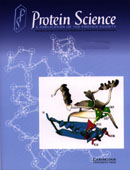Crossref Citations
This article has been cited by the following publications. This list is generated based on data provided by
Crossref.
Eisenmesser, Elan Zohar
Kapust, Rachel B.
Nawrocki, Joseph P.
Mazzulla, Marie J.
Pannell, Lewis K.
Waugh, David S.
and
Byrd, R.Andrew
2000.
Expression, Purification, Refolding, and Characterization of Recombinant Human Interleukin-13: Utilization of Intracellular Processing.
Protein Expression and Purification,
Vol. 20,
Issue. 2,
p.
186.
Kurucz, István
Hilbert, Ágnes
Kapus, Attila
Medgyesi, Dávid
Koncz, Gábor
Sármay, Gabriella
Erdei, Anna
and
Gergely, János
2000.
Bacterially expressed human FcγRIIb is soluble and functionally active after in vitro refolding.
Immunology Letters,
Vol. 75,
Issue. 1,
p.
33.
Ronacher, Bernhard
Marlovits, Thomas C.
Moser, Rosita
and
Blaas, Dieter
2000.
Expression and Folding of Human Very-Low-Density Lipoprotein Receptor Fragments: Neutralization Capacity toward Human Rhinovirus HRV2.
Virology,
Vol. 278,
Issue. 2,
p.
541.
Schroeckh, V.
Hortschansky, P.
Fricke, S.
Luckenbach, G.A.
and
Riesenberg, D.
2000.
Expression of soluble, recombinant αvβ3 integrin fragments in Escherichia coli.
Microbiological Research,
Vol. 155,
Issue. 3,
p.
165.
Chang, M
Walker, S E
and
Hoffman, R W
2000.
Immunization with a bacterial ATP-binding cassette transporter fragment suppresses autoimmunity and prolongs survival in MRL/lpr lupus-prone mice.
Lupus,
Vol. 9,
Issue. 9,
p.
655.
Wassenberg, Doris
Liebl, Wolfgang
and
Jaenicke, Rainer
2000.
Maltose-binding protein from the hyperthermophilic bacterium Thermotoga maritima: stability and binding properties.
Journal of Molecular Biology,
Vol. 295,
Issue. 2,
p.
279.
Kapust, Rachel B.
and
Waugh, David S.
2000.
Controlled Intracellular Processing of Fusion Proteins by TEV Protease.
Protein Expression and Purification,
Vol. 19,
Issue. 2,
p.
312.
Varshavsky, Alexander
2000.
Applications of Chimeric Genes and Hybrid Proteins - Part B: Cell Biology and Physiology.
Vol. 327,
Issue. ,
p.
578.
Hayhurst, Andrew
2000.
Improved Expression Characteristics of Single-Chain Fv Fragments When Fused Downstream of the Escherichia coli Maltose-Binding Protein or Upstream of a Single Immunoglobulin-Constant Domain.
Protein Expression and Purification,
Vol. 18,
Issue. 1,
p.
1.
Bevivino, Anthony E.
and
Loll, Patrick J.
2001.
An expanded glutamine repeat destabilizes native ataxin-3 structure and mediates formation of parallel β-fibrils.
Proceedings of the National Academy of Sciences,
Vol. 98,
Issue. 21,
p.
11955.
Nominé, Yves
Ristriani, Tutik
Laurent, Cécile
Lefèvre, Jean-François
Weiss, Étienne
and
Travé, Gilles
2001.
Formation of Soluble Inclusion Bodies by HPV E6 Oncoprotein Fused to Maltose-Binding Protein.
Protein Expression and Purification,
Vol. 23,
Issue. 1,
p.
22.
Marino, Stephen F
Shechner, David
and
Regan, Lynne
2001.
‘Morphs’ (MRFs): metal-reversible folding domains for differential IgG binding.
Chemistry & Biology,
Vol. 8,
Issue. 12,
p.
1221.
Ostermeier, Marc
and
Benkovic, Stephen J.
2001.
Evolutionary Protein Design.
Vol. 55,
Issue. ,
p.
29.
Kim, Geun Joong
Lee, Dong Eun
and
Kim, Hak-Sung
2001.
High-Level Expression and One-Step Purification of Cyclic Amidohydrolase Family Enzymes.
Protein Expression and Purification,
Vol. 23,
Issue. 1,
p.
128.
Ghosh, Inca
Sun, Luo
and
Xu, Ming-Qun
2001.
Zinc Inhibition of Protein trans-Splicing and Identification of Regions Essential for Splicing and Association of a Split Intein*.
Journal of Biological Chemistry,
Vol. 276,
Issue. 26,
p.
24051.
Meinander, Nina Q.
Jeppsson, Marie
and
Sögaard, Morten
2001.
Recombinant Protein Production with Prokaryotic and Eukaryotic Cells. A Comparative View on Host Physiology.
p.
159.
Liu, Qiang
Willson, Phil
Attoh-Poku, Sam
and
Babiuk, Lorne A.
2001.
Bacterial Expression of an Immunologically Reactive PCV2 ORF2 Fusion Protein.
Protein Expression and Purification,
Vol. 21,
Issue. 1,
p.
115.
Ganesh, C.
Zaidi, Faisal. N.
Udgaonkar, Jayant. B.
and
Varadarajan, Raghavan
2001.
Reversible formation of on‐pathway macroscopic aggregates during the folding of maltose binding protein.
Protein Science,
Vol. 10,
Issue. 8,
p.
1635.
Bach, Horacio
Mazor, Yariv
Shaky, Shelly
Shoham-Lev, Atar
Berdichevsky, Yevgeny
Gutnick, David L
and
Benhar, Itai
2001.
Escherichia coli maltose-binding protein as a molecular chaperone for recombinant intracellular cytoplasmic single-chain antibodies 1 1Edited by R. Huber.
Journal of Molecular Biology,
Vol. 312,
Issue. 1,
p.
79.
Fox, Jeffrey D.
Kapust, Rachel B.
and
Waugh, David S.
2001.
Single amino acid substitutions on the surface ofEscherichia colimaltose‐binding protein can have a profound impact on the solubility of fusion proteins.
Protein Science,
Vol. 10,
Issue. 3,
p.
622.


